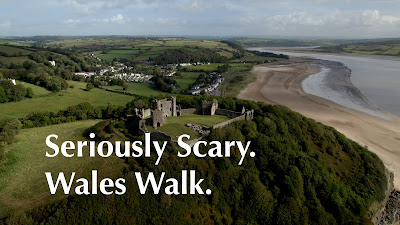It's not Dry, it's a Wet January! Safety tips
Dry January may be the buzz word for a lot of us at the start of this year, but not for HM Coastguard, who are used to responding to calls for help in the worst of weather conditions – with the start of the year bringing rainy, cold and windy conditions.
The temperature has been unseasonably warm, and while that has been great in luring so many of us to our wonderful coasts, it has also brought a lot of rain. Rain can cause serious safety concerns along the coast.
So we all need to be extra careful if we’re planning a trip to explore the coastal areas around the UK by making sure we know what to do if something goes wrong.
 |
| Stuck in the mud on a tidal flat (also known as a mudflat), it happens very easily, very quickly and with little warning, so know what to do if the worst happens |
So far in 2023, HM Coastguard has been called out to a number of incidents involving walkers who have found themselves in difficulty at the coast. In particular, there has been concern over the number of people getting stuck in tidal flood plains (better known as 'stuck in the mud') after teams rescued nine people across two days around the UK, including five on Crosby beach.
There have been further concerns for people cut off by the tide and pet owners needing help themselves after attempting to rescue their pet.
- Consider if it is safe to go out at all.
- Make sure you check the weather and tides if you decide it is safe to head out, wear appropriate footwear and clothing for your activity, know the sea conditions and stick to coastal paths.
- Pay attention to local warning signs.
- Beware of mud on beaches – if you do get stuck, try to spread your weight as much as possible and avoid moving. Do not attempt to rescue someone else, call the Coastguard.
- If you take your dog out with you, keep it on a lead at the coast especially near cliff edges. If they get stuck on a ledge, in mud or swept out to sea, don’t go after them. Most dogs make it back safely, but you might not. People often put themselves in danger in a rescue attempt.
- Carry a mobile phone so that you have a way of making contact in an emergency and make sure you tell someone where you are going and when you will be back.
- Cliffs can be more unstable than they look, and cliff falls or landslides can happen without warning. Take note and adhere to local warning signs. The cliffs along the UK coastline are continuously eroding, stay away from the edge which could be crumbly or slippery and do not climb cliffs as a short cut to the top. Periods of intense rainfall will often make cliff edges more vulnerable.
- Don’t ever be tempted to stand near the edge to take a ‘selfie’ as it may be the last photo you ever take.
- If you find suspected ordnance, do not touch it. Report it to your nearest Maritime Rescue Coordination Centre.




